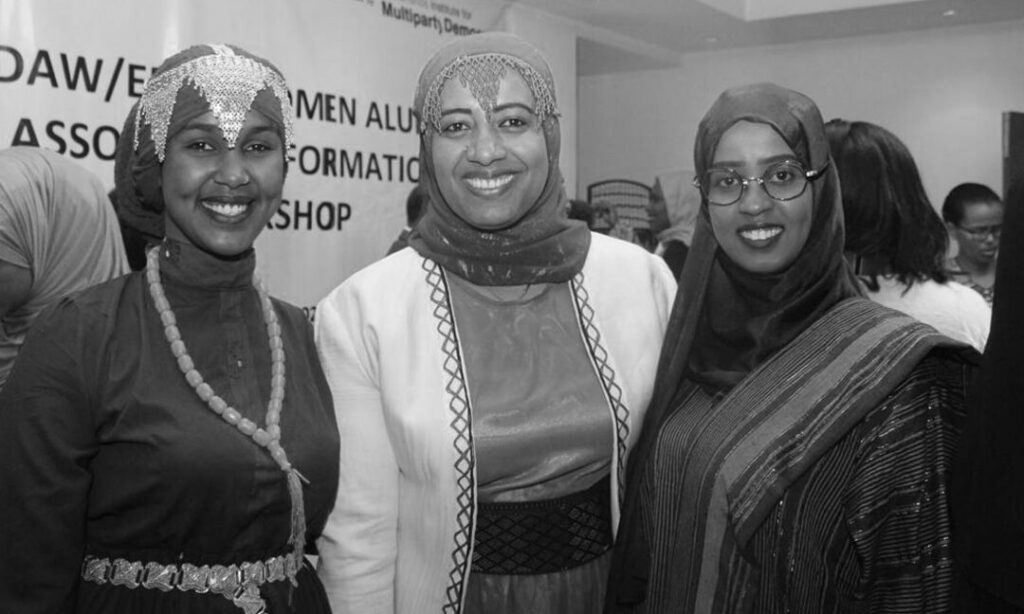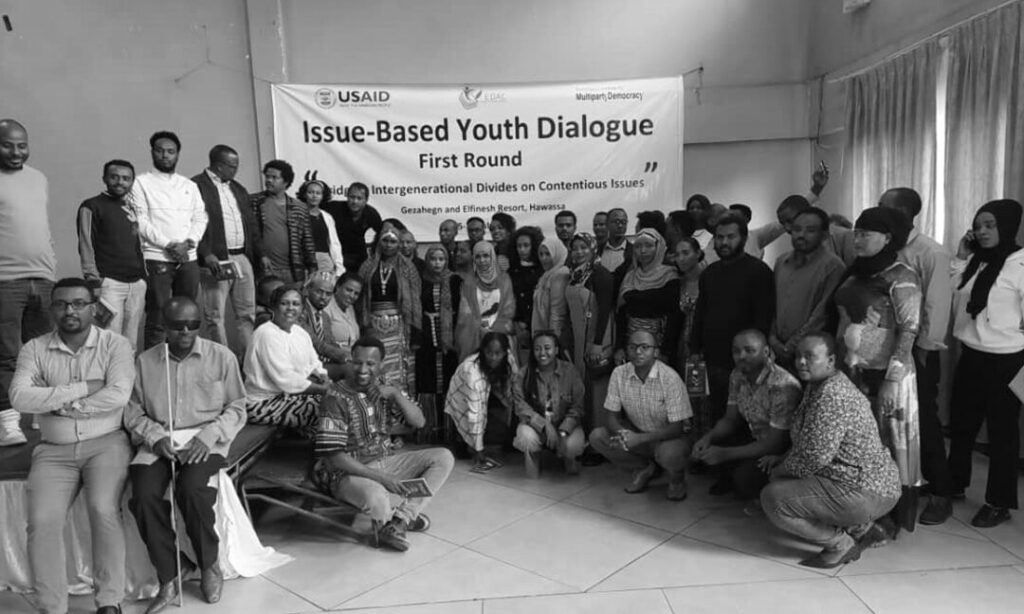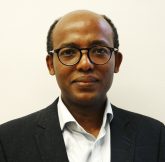Ethiopia


- NIMD in Ethiopia: At a glance
- What we do
- How we do it
- Meet the team
Main Objective
To consolidate Ethiopia’s emergent democracy by fostering inclusiveness, transparency and accountability at both the national and regional levels.
Results
At NIMD, we firmly believe that a dialogue process can only be truly democratic when all relevant groups are at the table. So, when 15 and national political parties pulled out of Ethiopia’s long-awaited National Dialogue, NIMD jumped into action, organizing interparty dialogues, high-level meetings and trust-building efforts to explore ways of making the National Dialogue more inclusive. A number of the parties have now agreed to take part in the dialogue, enhancing credibility and preventing a widening of rifts between the parties.
We developed a mobile app for the Oromia Caffee regional parliament. This tool connects citizens with all 504 MPs, providing profiles of MPs, along with their policies and voting records. It also allows direct communication with MPs, fostering feedback on parliamentary activities. By bridging the gap between people and politics, the app enables citizens to hold their regional representatives to account, and helps politicians respond better to constituents’ needs.
We supported Ethiopia’s federal parliament in developing an automated monitoring and evaluation system to enhance accountability and transparency. The system tracks the implementation of the parliament’s 10-year strategic plan and evaluates its effectiveness. By publishing information – such as progress reports, inputs, and outcomes – the tool helps the public take up their crucial role in democracy – holding their institutions to account.
Ethiopia: Political Background
The diversity of Ethiopia’s population is a source of rich culture and national pride. However, it also poses various political challenges. To manage this diversity and the challenges stemming from it, Ethiopia has adopted a federal system, with 12 states largely based along ethnic lines. The ethnic divide, however, continues to impact the country’s political landscape, with ethno-nationalist tensions frequently erupting into violence.
These tensions not only threaten peace and stability but also hinder efforts to build a thriving and inclusive multiparty democracy. The dominance of a single party further compounds these challenges, limiting political pluralism and exacerbating feelings of marginalization among certain groups.
In this context, accountability, transparency and inclusiveness are foundational elements for strengthening democracy and addressing Ethiopia’s unique political complexities. By ensuring that all voices are heard and decisions are made openly, the feelings of marginalization that contribute to conflict and tension can begin to ease, paving the way for greater trust in the political system over time.
What we do
The objective of NIMD’s programme in Ethiopia, which began in 2017, is to contribute to the consolidation of democracy at both the national and regional levels.
We strive to increase trust in politics through increased transparency, accountability and inclusiveness. We work, for example, with national and regional parliaments, providing them with training and tools to increase their effectiveness and share their work openly with the public.
To complement this, our Democracy Academy fosters a diverse and inclusive network of accountable and committed leaders; and our interparty dialogue initiatives aim to build trust so that political parties can work together towards electoral and political reforms.
What we do: In numbers
How we do it
Responsive politics
NIMD works with Ethiopia’s National Election Board (NEBE), the National Parliament, the Caffee Oromia, regional assemblies and political parties to strengthen parliamentary institutions and foster confidence in the political process. By equipping Ethiopia’s institutions with the tools and knowledge needed to function effectively, inclusively and transparently, we aim to ensure citizens’ needs are met through their democracy, and promote trust in politics.
For example, we deliver training and workshops for parliamentary delegates, covering essential topics such as drafting legislation, women’s leadership, and research and writing skills. These sessions help build the technical capacity of parliamentarians while fostering inclusive participation, particularly for women leaders.
Our work also involves ensuring parliaments have the right tools to engage with citizens, ensuring their voices are heard and taken into account in the law-making process. Our recent mobile app for the Oromia Caffee regional parliament, for example, allows citizens to communicate directly with local MPs, holding their regional representatives to account, and helps politicians respond better to constituents’ needs.
Democracy education
In 2020, NIMD’s Ethiopian Democracy Academy opened its doors to a diverse group of politicians and activists, with the aim of training the emerging politicians who will help shape Ethiopia’s political landscape. Two years later, we opened the Ethiopian Democracy Academy for Women, specifically for young and aspiring women politicians.
Our Academies welcome people aged between 22 and 40 years from across all of Ethiopia’s regions. We have participants from all Ethiopia’s political parties, most of whom are at the start of their career
But, despite their diversity, the participants are united in one thing: they are driven to learn, grow and strengthen Ethiopia’s democratization.
Through interactive sessions with expert facilitators, the participants delve into theoretical areas including rule of law, human rights and federalism. And they gain practical skills to help them advance in politics, for example, public speaking, leadership and conflict resolution.
But the curriculum goes beyond teaching knowledge and skills, also asking the participants to reflect on democratic values, including the role of politicians; their connection to the population; and their responsibilities to building a transparent and inclusive political system.
What’s more, one of the most important elements of the Democracy Academy is the rare opportunity for representatives from the government and opposition parties to interact in an informal environment, as they study, eat, cook and even play sports together. They build trust across divides, as they learn first-hand that friendships can transcend differences of opinion.
So, while they enter the Academy as a group divided by difference, our participants leave as a strong network of well-informed, skilled and determined young people dedicated to upholding the values of inclusiveness, accountability and transparency in all their work.
At NIMD, we recognize the importance of this cross-party network, and provide opportunities for the graduates to regularly reconnect, and exchange skills, knowledge and ideas. As part of this, we have launched two Alumni Networks. Alongside our recently established resource centre, these platforms play a vital role in facilitating collaborative work; and fostering trust, understanding, and democratic engagement among our graduates.
"Our participants are driven to learn, grow and strengthen Ethiopia’s democratization."
Women in politics
Women in Ethiopia face significant underrepresentation in politics. Despite recent progress such as increased representation in national parliament – women remain underrepresented in decision-making roles at all levels of government. Additionally, women who do participate in politics frequently encounter discrimination, lack of support, and limited opportunities for advancement. Addressing these challenges is essential, not only for achieving gender equality but also for fostering a more inclusive and representative democracy that truly reflects the diverse voices of Ethiopian society.
Recognizing this, NIMD has made the inclusion of women a central priority within our Democracy Academies. In 2023, our commitment led to the launch of the Ethiopian Democracy Academy for Women.
This two-week retreat provides young and aspiring women politicians with targeted training, helping them develop the confidence, knowledge, and leadership skills needed to thrive in political life. The Academy for Women builds on the core principles of our Ethiopian Democracy Academy, while also addressing the unique challenges faced by women in politics, ensuring that women’s voices are not only heard but actively shape Ethiopia’s political landscape.
"We foster a more inclusive and representative democracy that truly reflects the diverse voices of Ethiopian society."
Dialogue
Including voices from across the political and ethnic spectrum is key to the success of any political reform in Ethiopia, and NIMD contributes to promoting this inclusive environment by supporting a number of national and regional dialogue platforms.
NIMD began a collaboration with the National Electoral Board of Ethiopia (NEBE) in 2018. Given the NEBE’s mandate to organize political dialogue on electoral and political reforms, this collaboration has opened up many avenues for interparty dialogue.
In 2019, the NEBE established the Inter-Party Dialogue Platform. This platform brings together political parties from across Ethiopia’s political spectrum to regularly engage in dialogue. By actively listening to each other, putting aside differences, and seeking consensus, the parties can work towards inclusive reforms that put the needs of Ethiopia’s people first.
NIMD supports this process by providing training and support to the NEBE, as well as training the political parties on dialogue skills.
We also recognize the need for different types of dialogue, to build trust across different divides and ensure diverse voices are heard. We organize, for example, regular dialogue meetings for senior leaders of political parties to connect, build trust and discuss topical issues.
And our intergenerational dialogues bring together Democracy Academy graduates with senior politicians. As well as providing an important networking opportunity for our graduates, these dialogues also help to increase trust and mutual understanding; overcome stereotypes; and diminish polarization between generations in politics.
Meet the team
 Yinebeb Nigatu
Country Director, NIMD Ethiopia
Read more
Yinebeb Nigatu
Country Director, NIMD Ethiopia
Read more
Get in touch directly with NIMD Ethiopia via nimdethiopia@nimd.org
NIMD Ethiopia is based in Addis Ababa. Yinebeb Nigatu has a degree in law, an MA in International Politics, and a PhD in political science. He has more than 10 years’ experience as a researcher, consultant, manager, and academic, focusing on democracy, peace and security, and rule of law in Ethiopia and the Horn of Africa.

Get in touch directly with NIMD Ethiopia via nimdethiopia@nimd.org
NIMD Ethiopia is based in Addis Ababa. Yinebeb Nigatu has a degree in law, an MA in International Politics, and a PhD in political science. He has more than 10 years’ experience as a researcher, consultant, manager, and academic, focusing on democracy, peace and security, and rule of law in Ethiopia and the Horn of Africa.
Who we work with
Our work in Ethiopia is funded by the Royal Netherlands Embassy in Ethiopia; the Netherlands Ministry of Foreign Affairs under the Power of Dialogue programme; the European Union; the Foreign, Commonwealth and Development Office of the UK Government; and USAID.

 Facebook
Facebook